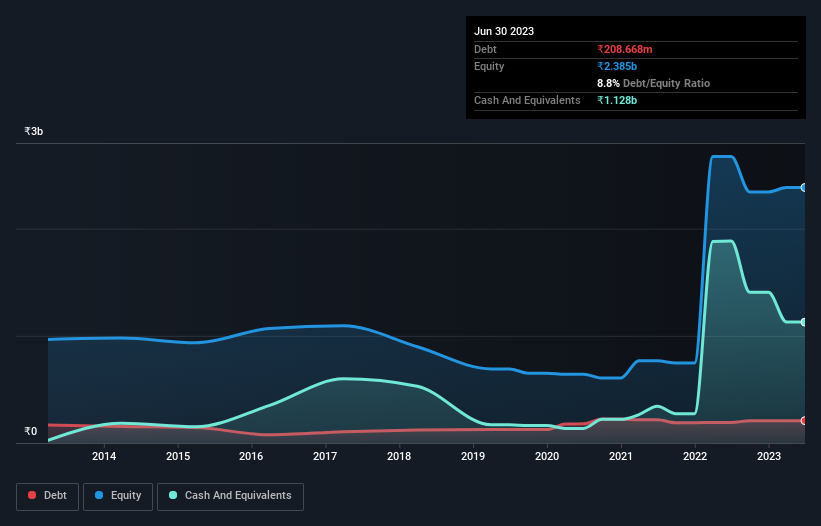Is Indian Card Clothing (NSE:INDIANCARD) Using Debt In A Risky Way?

David Iben put it well when he said, 'Volatility is not a risk we care about. What we care about is avoiding the permanent loss of capital.' So it seems the smart money knows that debt - which is usually involved in bankruptcies - is a very important factor, when you assess how risky a company is. We note that The Indian Card Clothing Company Limited (NSE:INDIANCARD) does have debt on its balance sheet. But should shareholders be worried about its use of debt?
When Is Debt Dangerous?
Debt is a tool to help businesses grow, but if a business is incapable of paying off its lenders, then it exists at their mercy. If things get really bad, the lenders can take control of the business. While that is not too common, we often do see indebted companies permanently diluting shareholders because lenders force them to raise capital at a distressed price. Of course, plenty of companies use debt to fund growth, without any negative consequences. The first step when considering a company's debt levels is to consider its cash and debt together.
View our latest analysis for Indian Card Clothing
What Is Indian Card Clothing's Debt?
You can click the graphic below for the historical numbers, but it shows that as of March 2023 Indian Card Clothing had ₹208.7m of debt, an increase on ₹191.9m, over one year. However, its balance sheet shows it holds ₹1.13b in cash, so it actually has ₹919.7m net cash.

How Healthy Is Indian Card Clothing's Balance Sheet?
According to the last reported balance sheet, Indian Card Clothing had liabilities of ₹178.3m due within 12 months, and liabilities of ₹250.3m due beyond 12 months. Offsetting these obligations, it had cash of ₹1.13b as well as receivables valued at ₹154.9m due within 12 months. So it can boast ₹854.7m more liquid assets than total liabilities.
This surplus strongly suggests that Indian Card Clothing has a rock-solid balance sheet (and the debt is of no concern whatsoever). With this in mind one could posit that its balance sheet means the company is able to handle some adversity. Simply put, the fact that Indian Card Clothing has more cash than debt is arguably a good indication that it can manage its debt safely. When analysing debt levels, the balance sheet is the obvious place to start. But it is Indian Card Clothing's earnings that will influence how the balance sheet holds up in the future. So if you're keen to discover more about its earnings, it might be worth checking out this graph of its long term earnings trend.
Over 12 months, Indian Card Clothing made a loss at the EBIT level, and saw its revenue drop to ₹644m, which is a fall of 6.0%. We would much prefer see growth.
So How Risky Is Indian Card Clothing?
While Indian Card Clothing lost money on an earnings before interest and tax (EBIT) level, it actually booked a paper profit of ₹56m. So taking that on face value, and considering the cash, we don't think its very risky in the near term. The next few years will be important as the business matures. When analysing debt levels, the balance sheet is the obvious place to start. However, not all investment risk resides within the balance sheet - far from it. These risks can be hard to spot. Every company has them, and we've spotted 4 warning signs for Indian Card Clothing you should know about.
At the end of the day, it's often better to focus on companies that are free from net debt. You can access our special list of such companies (all with a track record of profit growth). It's free.
New: AI Stock Screener & Alerts
Our new AI Stock Screener scans the market every day to uncover opportunities.
• Dividend Powerhouses (3%+ Yield)
• Undervalued Small Caps with Insider Buying
• High growth Tech and AI Companies
Or build your own from over 50 metrics.
Have feedback on this article? Concerned about the content? Get in touch with us directly. Alternatively, email editorial-team (at) simplywallst.com.
This article by Simply Wall St is general in nature. We provide commentary based on historical data and analyst forecasts only using an unbiased methodology and our articles are not intended to be financial advice. It does not constitute a recommendation to buy or sell any stock, and does not take account of your objectives, or your financial situation. We aim to bring you long-term focused analysis driven by fundamental data. Note that our analysis may not factor in the latest price-sensitive company announcements or qualitative material. Simply Wall St has no position in any stocks mentioned.
About NSEI:INDIANCARD
Solid track record with adequate balance sheet.
Similar Companies
Market Insights
Community Narratives




